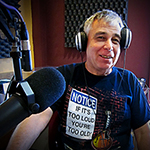 A long, long time ago, in 1958, Jerry Lee Lewis and Chuck Berry were backstage prior to the first performance of one of the early rock-and-roll shows. They were celebrating the kick off of a two-month tour by arguing about who would close the show.
A long, long time ago, in 1958, Jerry Lee Lewis and Chuck Berry were backstage prior to the first performance of one of the early rock-and-roll shows. They were celebrating the kick off of a two-month tour by arguing about who would close the show.
They were hopelessly deadlocked, so the final call fell into the lap of the show’s host and producer.
He chose Berry.
Lewis was so angry he concluded his set with Great Balls of Fire. And then he torched his piano.
The host who inflamed the situation was Alan Freed.
“I think he contributed a great deal to integration in this country. By getting white teenagers to listen to music by black artists, he drew people together.”
Freed made many questionable, or outright poor, decisions in his career. He unapologetically accepted payola. He appropriated the work of others. He was rumored to enjoy the company of John Barleycorn.
All have become part of Freed’s legacy, balancing out what’s on the other side of his ledger: Freed was the man who turned America on to rock-and-roll.
But Freed’s ledger has a third column, one not nearly as familiar as the other two.
“I think Alan Freed is an unsung hero in terms of race relations in this country,” said Dave Milberg, rock-and-roll historian, former syndicated radio personality, and host of the Rare & Scratchy Rock ‘N Roll podcast. He recently produced a podcast episode on rock-and-roll and its impact on race relations.
“Freed opened the doors. He played artists nobody else would play. Especially I think he contributed a great deal to integration in this country. By getting white teenagers to listen to music by black artists, he drew people together.”
I remember listening to Freed on WINS radio in New York City. I was too young to understand the social implications of the music he played. Besides, radio had the advantage of being color blind. But a conservative Congress was not. When it decided to take on the threat posed by what was called “race music,” Freed became an easy target.
“It was typical at the time for DJs to take money, gifts, women, and drugs to plug a record,” Milberg said.
Ah, payola. Back then, it meant nothing to me. If it took a C-note, some coke, or a starlet in the studio wearing nothing but a fur coat and a smile, to provide an alternative to Perry Como and Doris Day, God bless ’em.
(When I landed in radio payola had a sudden appeal, but the practice was long gone. I had to get my own women.)
Freed wasn’t alone in taking payola. But, his high profile and stand-fast attitude angered legislators under pressure to clean up the radio airwaves.
“Dick Clark who was playing rock-and-roll in Philadelphia, heavily favored records from companies he owned pieces of,” according to Milberg. “In front of Congress, Clark was very apologetic, promising to get rid of all his interests in record companies. ‘If I’ve done anything wrong I’m very sorry,’ he said. It was enough to allow him to escape punishment.”
Freed, however, was in a New York state of mind. Assertive. Aggressive. Uncompromising.
“Then Congress met Alan Freed who has an attitude and an alleged alcohol problem. He didn’t come off as a clean-cut, all-American boy,” Milberg said.
Was Congress out to punish Freed for his sins? Milberg thinks not, even though Freed’s concerts typically had more going on in front of the stage than on it.
“He had black and white teens in the audience,” Milberg said, “and the local officials—the police or city fathers and city mothers—would segregate the auditoriums. Freed was vocal about his disapproval. In fact, at a Boston concert, as officers were separating the whites and the non-whites, he said, ‘The police don’t want you to enjoy this concert.’”
Freed was hardly a calming influence.
“Nevertheless,” Milberg said, “I think he was a victim of the purge on rock-and-roll. He just happened to be the most visible and the most outrageous promoter.”
Freed died in 1965, a victim of alcohol and a stiff backbone.
Ironically, rock-and-roll, the compound word that’s the cornerstone of his legacy, isn’t his. Most music historians attribute the term to slang for sex.
“It actually goes back to the 1800s,” according to Milberg, “as a seafaring term, for mentioning how the cargo moved about on a ship. There were songs in the 1920s that mentioned rock and roll. Freed just popularized it.”
Alan Freed made a career out of popularizing one term, along with hundreds of entertainers that wouldn’t have otherwise been heard.
He just couldn’t do the same for himself.
Start your Sunday with a laugh. Read the Sunday Funnies, fresh humor from The Out Of My Mind Blog. Subscribe now and you'll never miss a post.
Dave (“Radio Dave”) Milberg began his broadcasting career at the legendary WXYZ in Detroit, and then worked his way through broadcasting as a marketing director, producer and jack-of-all-trades. CBS Radio hired him in the 1970s to apply the principles of Top 40 radio to the new All News format. CBS also paid for him to earn a law degree. From 1983 to 1985, Milberg wrote and produced a three-hour-a-week syndicated radio show called Rare & Scratchy Rock ‘N Roll, which played, “The oldies that time forgot, but maybe you remember.” The program was heard on more than 135 radio stations across the country. He’s been an occasional DJ at Sarasota-based WSLR-LPFM, and since 2008 has made guest appearances on numerous radio stations. Today, Milberg works as a law school professor, but that hasn’t dulled his edge for rock-and-roll. The Rare & Scratchy Rock ‘N Roll podcast is his way of sharing his extensive knowledge of rock music with fans of the genre.
Mind Doodle…
In the 50’s, Little Richard reportedly threw Jimi Hendrix out of his band for stealing the spotlight. It’s lucky Freed helped name the music rock and roll. Otherwise, it might have been called Friday Night Fights.

Great piece. I mention Alan Freed often on my radio show http://johnnymaraca.com
Hi John…
Thanks for the comment. I’m glad you liked the Alan Freed story. Strange twist of fate that years later I wound up working at what at the time was his biggest competitor, the former WMGM in New York.
I’ll give a listen to your show. We need to keep rock and roll’s roots alive.
— jay
I was always a big Alan Freed fan… nice to know the inside story. A few nice one-liners in here too, Jay. Thanks.
Hi Nick…
A good deal of the credit goes to Dave Milberg. He’s a walking Wikipedia. The one-liners are mine, though I’m not sure where they are.
— jay